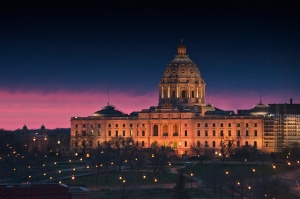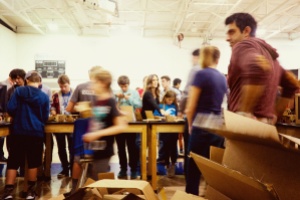 The following legislative update was written by Elaine Keefe, library lobbyist for the Minnesota Library Association (MLA) and Information Technology Educators of MN (ITEM).
The following legislative update was written by Elaine Keefe, library lobbyist for the Minnesota Library Association (MLA) and Information Technology Educators of MN (ITEM).
Received Sunday, March 8, 2015 at 3:16 pm
MDE Education Policy Bill: Last week the MDE education policy bill, HF 1591/SF 1495, was heard in committee in both bodies. The bill includes two provisions of interest. The first repeals the requirement that school districts have a technology plan on file with MDE in order to be eligible for telecommunications equity aid. The second requires that the governing board of a regional public library system employ a full-time chief administrative officer.
Parental Review of School Library Media Center Materials: A bill was introduced in both bodies last week that would expand an existing law requiring school districts to have a procedure for parents to review the content of instructional materials and to arrange alternative instruction if the parent objects to the content. The bill specifies that this applies to instructional materials in a classroom, school library or media center. It also requires that when a parent objects to the content because he or she considers it to be sexually explicit or obscene, the district must notify the parents of all students who are being provided that content that a parent has objected to it on that basis. The name of the parent making the objection would be private data.
HF 1648/SF 1449 was introduced in the House by Rep. Abigail Whelan (R – Anoka) and it has many co-authors, all Republican. It was introduced in the Senate by Senator Dan Hall (R – Burnsville). All co-authors are Republicans. The bill will not receive a hearing this session.
Regional Library Basic System Support (RLBSS): Last week a bill was introduced to change the RLBSS formula by increasing base portion from 5% to 15% of the distribution and reducing the equalization portion of the formula from 25% to 15% of the distribution. The bill also increases funding for RLBSS by $5 million per year.
The House version, HF 1626, was introduced by Rep. Sondra Erickson (R – Princeton). Co-authors are Rep. Mary Murphy (DFL – Hermantown), Rep. Greg Davids (R – Preston), Rep. Paul Marquart (DFL – Dilworth), Rep. Bud Nornes – R – Fergus Falls) and 10 others. The Senate version, SF 1675 was introduced by Senator LeRoy Stumpf (DFL – Plummer). Co-authors are Senator Tom Saxhaug (DFL – Grand Rapids), Senator Gary Dahms (R – Redwood Falls) and Senator Vicki Jensen (DFL – Owatonna).
Coming Up this Week: The House Education Innovation Policy Committee and the Senate Education Committee will each release their respective omnibus education policy bills this week, hear the bills and pass them out of committee by the end of the week in order to meet the first committee deadline, which is Friday, March 20.
Governor Dayton will release his supplemental budget proposal this week. He has already announced that it will include more funding for universal preschool for 4 year olds, more funding for the MnSCU system and more funding for nursing homes.
Elaine Keefe
Capitol Hill Associates
525 Park Street, Suite 310
St. Paul, MN 55103
(office)651-293-0229
(cell) 612-590-1244
elaine@capitolhillassoc.com
Image credit: http://tinyurl.com/p4m2ool, licensed under CC BY-NC-ND 2.0




